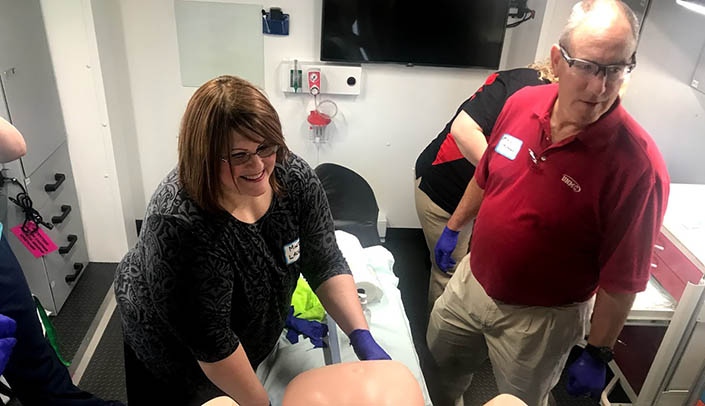UNMC is providing perinatal simulation training to rural health care providers that will benefit babies and moms when they need it most.
Funded by a grant from the Nebraska Department of Rural Health, the training will give rural providers the latest information and training on neonatal resuscitation and high-risk delivery.
Obstetrical and neonatal experts from UNMC, along with SIM-NE, the Nebraska Perinatal Quality Improvement Collaborative (NPQIC) and various community partners from across the state were in West Point, Neb., on June 4 for a daylong training session. The team provided didactic lectures and skills labs and, using UNMC’s SIM-NE trucks, presented two simulation experiences on neonatal resuscitation and high-risk delivery.
“We know many of our critical care hospitals are doing 50 to 100 deliveries a year,” said Ann Anderson Berry, M.D., Ph.D., associate professor of pediatrics at UNMC and interim division chief of neonatology at Nebraska Medicine. “So, a nurse or provider might only see an infant that needs advanced resuscitation or a mom with complications once every three, five or seven years. And taking their medical training and neonatal courses every two years probably doesn’t keep their skill set up to where they’d like it to be for high-risk, low-volume deliveries.”
The team plans to fill that gap by offering training in Nebraska communities so up to 35 people per session can work and train together to refresh their skills. “They’ll be able to practice on simulation mannequins so they are ready for the next high-risk delivery that walks into their hospital,” Dr. Anderson Berry said.
The team anticipates doing one training session per month through 2018. In its first outing, training was provided in Crete, Neb.
“It’s such a nice statewide collaboration,” Dr. Anderson Berry said. “And, more importantly, it could make a big difference in the health outcomes for mom and baby.”
